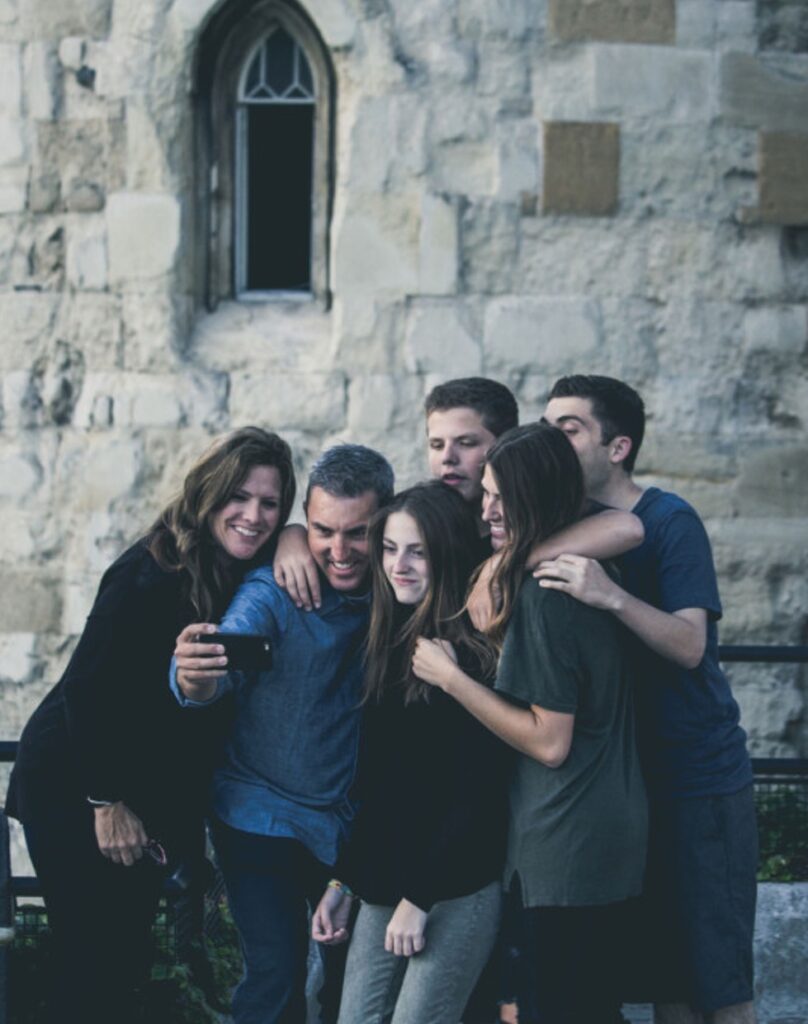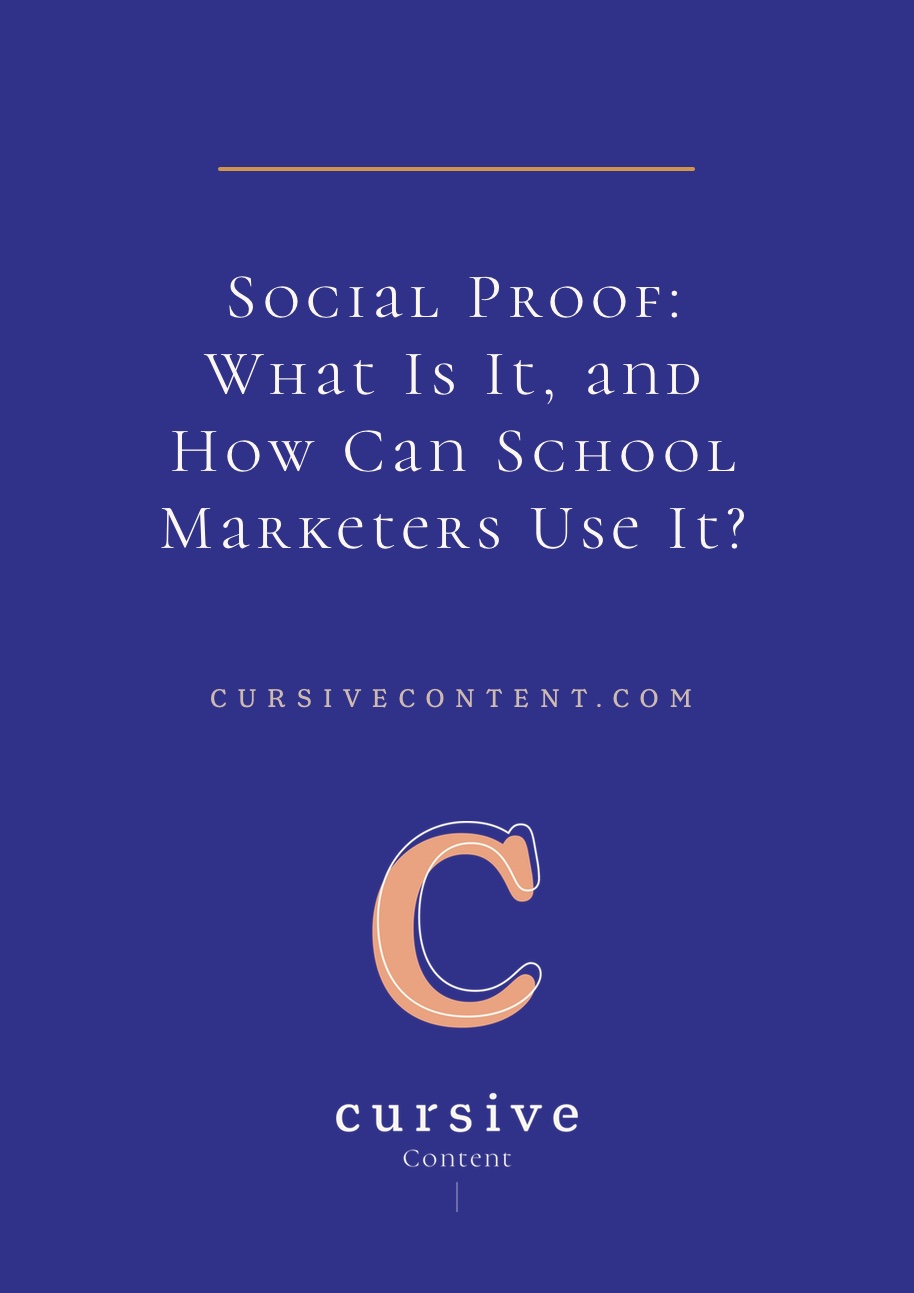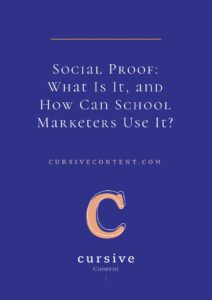Social Proof: What Is It, and How Can School Marketers Use It?

I’m currently in vacation-planning-obsessed mode. (Aren’t we all?)
Right now, I’m trying to plan our first family trip to Yellowstone National Park. We’ve never been before, so I’ve been Googling and Pinterest-ing like crazy, trying to find the best insider information for my itinerary.
And I have a ton. Too much, actually. I’m so inundated with information that I don’t even know where to begin.
So where did I turn? Facebook. I asked my contacts if they had any suggestions for things to do and places to stay. I got some fabulous replies — and I’ve tentatively picked a hotel based on the feedback I got.
That, my friends, is social proof.
Also called social influence, social proof is when someone uses the actions or reactions of others to help them make a decision.
Or, if you want to get really Wiki-technical:
“Social proof is a psychological phenomenon where people assume the actions of others in an attempt to reflect correct behavior for a given situation. This effect is prominent in ambiguous social situations where people are unable to determine the appropriate mode of behavior, and is driven by the assumption that surrounding people possess more knowledge about the situation.”
People are being influenced on social media all day, every day. So how can your school control or leverage social proof in a positive way?
In the TechCrunch post “Social Proof Is The New Marketing“, Aileen Lee writes about five types of social proof. Here’s how to consider each in the context of your school’s marketing:
#1: Expert Social Proof
This is social proof that comes from someone with a known or respected authority. Think professional publications, trusted news sources, or highly regarded writers, researchers, or bloggers. How can you capture this type of social proof?
- Review any third-party articles written about your school. Are there positive opinion quotes that you can pull out and share? Turn them into graphics that can be easily posted on your social platforms.
- Consider rankings. Has your school achieved top rankings for programs, academics, achievement, etc? Make sure to highlight those proudly.
#2: Celebrity Social Proof
Pretty straightforward: like expert social proof, this type of influence comes from a well-known name. But remember: “celebrity” nowadays is a broad term. Because of social media, everyday individuals who produce great content can amass a celebrity-like following.
- Do you have any high-profile alumni whom you can quote? Be sure to use photos when possible!
- Do any of your current or past students have impressive social media followings? Consider working with them to share content about your school in a way that is authentic to their digital brands. Perhaps this is sharing a #TBT photo of their time on campus, or posting about a favorite tradition.
#3: User Social Proof
This comes from “customers” (aka, students, families, even faculty and staff). They know your school because they’re part of the school community. That gives them a lot of credibility — and lots of influence. What can you do with it?
- Scour social media for positive mentions of your school from actual school community members, and share away! Embed them on your blog or website, use them in printed communications, repost them on your social sites — and THANK the influencers for their kind words.
- When you find negative comments, don’t shy away. Engage in a positive, open conversation with people to show that your school values their feedback and wants to start a dialogue.
#4: Wisdom-of-the-Crowds Social Proof
“Over 1 Billion Served”. Yep, this one has to do with sheer numbers. Because if lots of people like something, it has to be good, right?
- Do you have any impressive numbers to share? Perhaps you have the biggest program of a specific kind in your area. Or, you have an impressive number of global students. You may have fantastic alumni support or a huge waiting list. Highlight the big and the bold.
#5: Wisdom-of-Your-Friends Social Proof
The people you know and love in real life are huge influencers on decision-making. In fact, in a recent study, 68% of millennials said they trust peer reviews of products — which is more than they trust professional reviews!
- Make it easy for your school community to share your information with their own social networks. Provide your biggest advocates with ready-written social posts to share, or call out easy social updates on your blog using a service like Click-to-Tweet.
- Ask people to share! Too often we forget to prompt social sharing. At the end of blog posts or emails, it’s easy to say: Liked this content? Share it on social! Sometimes the smallest ask can turn into big wins.
Those are five types of social proof that you can use to win friends and influence people online, but there are many more. How is your school creatively using social influence? Share your ideas or success stories in the comments!
MORE ARTICLES
-
 How to Support Your School Story with Organic, Authentic Social Media
How to Support Your School Story with Organic, Authentic Social Media -
 What Is Your Private School’s Bold & Unifying Big Promise?
What Is Your Private School’s Bold & Unifying Big Promise? -
 AI Writing Prompts to Power Private School Storytelling
AI Writing Prompts to Power Private School Storytelling -
 When to Outsource Your Private School Content Marketing to an Expert
When to Outsource Your Private School Content Marketing to an Expert -
 3 Unique Ways to Attract Dream Families with Content
3 Unique Ways to Attract Dream Families with Content -
 How to Attract Dream Families with Unforgettable Private School Social Media Advertising
How to Attract Dream Families with Unforgettable Private School Social Media Advertising -
 How to Write a Compelling School Magazine Article People Want to Read
How to Write a Compelling School Magazine Article People Want to Read -
 4 Quick & Easy Ways to Improve Your School’s Emails
4 Quick & Easy Ways to Improve Your School’s Emails

